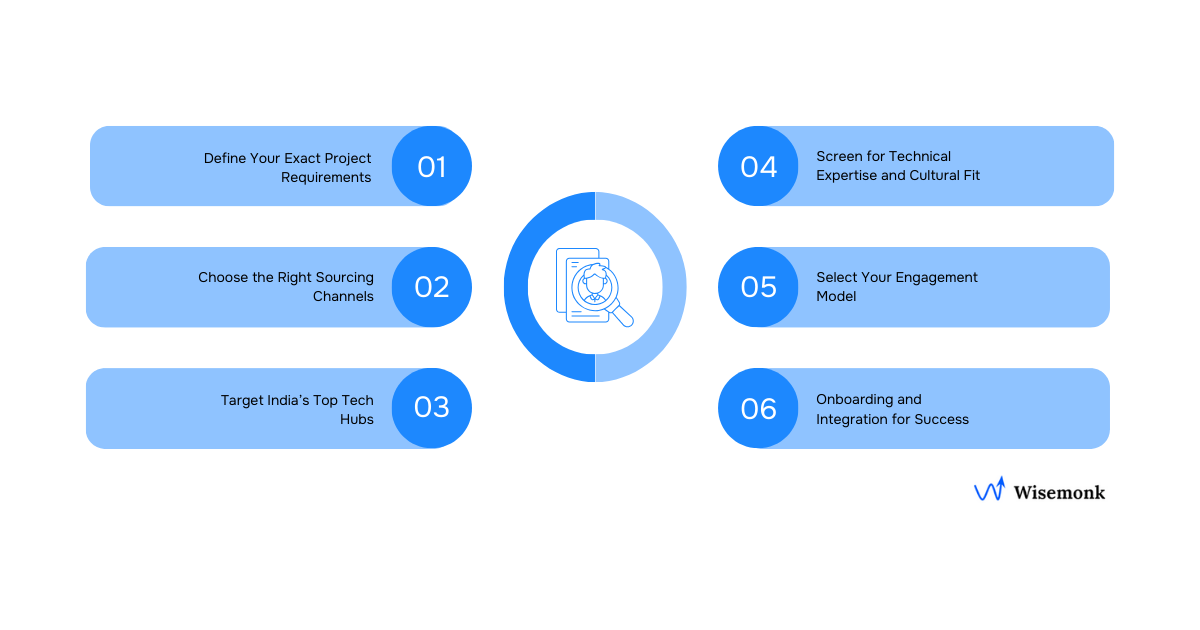Looking to hire Python developers in India to build scalable products, automate processes, or strengthen your backend infrastructure? We help global teams connect with experienced Python developers who specialize in web development, data engineering, machine learning, and cloud-ready applications.
We created this practical guide to help global companies understand how to find, evaluate, and manage high-quality Python developers across markets. Whether you’re hiring your first Python developer or building a complete Python development team, this guide will help you make confident decisions and scale your engineering capabilities with clarity.
Why hire Python developers in India?[toc=Why Hire Python Developers]
If your engineering team is stretched thin, or you’re struggling to build scalable Python applications fast enough, it’s probably time to hire Python developers in India. The country has one of the world’s largest pools of skilled Python developers who work across backend engineering, data science, automation, and AI solutions.
India has emerged as a global hub for Python development, bolstered by over 2.5 million STEM graduates annually and a robust ecosystem of developers specializing in modern frameworks, scalable architectures, and agile development practices. These engineers are already building software for global clients, which makes them easy to integrate into distributed teams.
Most companies choose to hire Python developers in India because:
- Massive Python talent pool: India has one of the highest concentrations of Python programmers, including experts in web applications, scientific computing, predictive analytics, and machine learning models.
- Deep technical expertise: Developers specialize in Django, Flask, FastAPI, data pipelines, robust APIs, cloud services, and scalable solutions for high-traffic environments.
- Flexible hiring models: Companies can hire dedicated Python developers, build full development teams, or scale up quickly using flexible engagement models based on project complexity.
- Global collaboration experience: Developers in India are comfortable with agile development methodology, version control, cross-functional teamwork, and rapid prototyping cycles.
- Strong value without compromising quality: You can hire experienced Python developers at competitive global rates, which helps stretch engineering budgets while still maintaining high code quality.
Hiring Python developers in India gives you access to top Python talent, proven expertise across modern tech stacks, and the ability to scale development efforts quickly while keeping your core team focused on strategic priorities.
What do Python developers in India actually do?[toc=Key Responsibilities]
Python developers in India work across a wide range of engineering and data-heavy functions. They build scalable backend systems, power AI applications, automate workflows, and support data-driven decision making. This versatility is exactly why global companies rely on India to scale engineering teams faster and more cost effectively.
Most Python developers in India contribute to one or more of the following areas.
1. Backend and Web Development
Developers build scalable web applications, REST APIs, microservices, and server-side logic using Django, Flask, and FastAPI. They also manage databases, integrate third party services, and optimize backend performance for global traffic.
2. AI and Machine Learning
A fast growing segment of Indian Python talent works on training models, building predictive systems, and using scientific computing tools such as NumPy, Pandas, TensorFlow, and PyTorch.
This track includes three key roles:
- Data Scientist: Works on predictive modeling, experimentation, feature engineering, and converting business problems into ML solutions.
- Data Analyst: Analyzes large datasets, builds dashboards, runs SQL queries, and creates business insights using Python and BI tools.
- Data Engineer: Builds and maintains large scale data pipelines, manages ETL workflows, and ensures clean and reliable data delivery for analytics and ML systems.
3. Data Engineering and Pipelines
Python developers create data ingestion workflows, automate ETL processes, and build pipelines that support analytics, BI reporting, and ML models. This is essential for companies that rely heavily on forecasting and real time insights.
4. Automation and Scripting
Python is widely used to automate repetitive workflows, build internal utilities, integrate cloud services, monitor systems, and modernize older codebases. It often acts as the glue connecting distributed systems.
5. Custom Software Development
Developers build tailored Python applications such as ecommerce tools, dashboards, internal platforms, and SaaS modules. These projects often involve collaboration with product, UX, and cloud engineering teams.
6. Ongoing Development and Maintenance
Developers handle testing, debugging, documentation, version control, code reviews, and long term maintenance of production systems. They ensure stability while supporting fast moving feature development in agile environments.
A good Python developer in India adapts to project requirements, collaborates with global teams, and works within agile development practices to deliver scalable solutions. Whether you're building a new platform or expanding your current tech stack, these developers integrate Python into complex systems and help accelerate business growth.
What skills should you look for in a Python developer?[toc=Essential Skills]
Hiring a Python developer is really about finding someone who can ship real software, handle messy real-world problems, and collaborate smoothly with global teams. And because India has one of the world’s largest and most diverse Python talent pools, knowing what to look for matters a lot.
To keep things tight and useful, here is a clear split between the two main Python tracks you typically hire for: Web Development and Machine Learning and Data Science.
A good Python developer combines deep expertise in Python development with the ability to build scalable solutions, foster collaboration across teams, and deliver impactful software that directly supports long-term business growth.
How to hire Python developers in India? (step by step)[toc=How to Hire]
Hiring technical talent in a foreign market like India requires a structured and compliant approach to ensure you secure high-quality, dedicated Python developers without unnecessary risk. To succeed, you need a clear roadmap that covers sourcing, rigorous vetting, and seamless integration.
This step-by-step process ensures you find the best python developers and integrate them smoothly into your global development team:

Step 1: Define Your Exact Project Requirements
Before beginning the search, you must clearly define the role and the expected output. Specify the required tech stack and the nature of the project. Do you need FastAPI developers for high-performance microservices, or experts in data manipulation for data pipelines?
Clarity on project requirements and complexity will attract candidates with the right deep expertise in fields like web development or data engineering.
Step 2: Choose the Right Sourcing Channels
Where you look will determine the quality and speed of your hire. For global clients, the most efficient avenues to find top python talent include:
- Specialized Talent Platforms: Platforms like Wisemonk or Toptal are ideal for quickly accessing pre-vetted, expert python developers without the hassle of lengthy, localized screening.
- Global Job Boards: Utilizing platforms like LinkedIn India or local IT job sites is effective for reaching a broad audience of python programmers and general software development talent.
- Referral Networks: Leveraging existing connections within the Indian tech community can often lead to highly recommended skilled developers who bring proven expertise.
Step 3: Target India’s Top Tech Hubs
While remote hiring offers flexibility, talent density is highest in specific metropolitan areas. Focusing your search on these cities increases your chances of finding specialized python experts:
- Bengaluru (Bangalore): The heart of India’s tech scene, providing the highest concentration of developers in India and startups focused on innovative solutions, particularly in AI and machine learning.
- Hyderabad & Pune: Major enterprise hubs known for producing talent with strong experience in large-scale custom software development and modernizing legacy systems.
- Delhi NCR (Gurugram & Noida): Strong focus on e-commerce, fintech, and supporting the operations of large global clients.
Step 4: Screen for Technical Expertise and Cultural Fit
Do not rely solely on certifications. Your interview process must evaluate real-world skills and the ability to work within an agile development methodology:
- Code Assessment: Administer practical coding tests (focused on Python libraries and efficiency) and case studies relevant to your project complexity. Test their ability to write testable code.
- Portfolio Review: Examine their GitHub repositories or past projects to gauge their proficiency in building scalable solutions and maintaining high code quality.
- Communication Test: During the final interviews, assess their ability to clearly explain complex technical decisions in English to non-technical project managers and stakeholders.
Step 5: Select Your Engagement Model
The final decision is how to formalize the employment, which affects compliance and administrative overhead. This decision hinges on your need for long-term commitment versus short-term flexibility.
- EOR (Employer of Record): Best for establishing a long-term, dedicated python developers relationship. An EOR handles all local labor law compliance, payroll, and statutory benefits in India, allowing you to focus purely on managing the work.
- Contractors (Freelance/Consulting): Suitable for specific, short-term development phase needs or rapid prototyping. This offers maximum flexibility but requires more direct management.
- Direct Local Entity: Only viable for large corporations undertaking significant business expansion that requires setting up their own legal entity in India.
Global clients often choose EOR when they want a dedicated team without operational overhead.
Step 6: Onboarding and Integration for Success
The integration phase is crucial for transforming a new hire into an extension of your core team.
- Compensation Package: Ensure your offer covers the total Cost to Company (CTC), including base salary, bonuses, and equipment. Research competitive rates for top python developers in the target city.
- Foster Collaboration: Set a clear time zone overlap for daily stand-ups and meetings to ensure foster collaboration and manage expectations using agile development practices.
- Access and Knowledge Transfer: Provide immediate, secure access to your version control systems, cloud environments, and internal documentation. Teach them the broader business growth goals so their work on python applications is strategic.
By following this hiring path, you reduce the chances of mismatched talent and build a Python development team that contributes from day one. This method helps you find Python developers who deliver scalable solutions, maintain high code quality, and support your long-term engineering goals.
How much does it cost to hire a Python developer?[toc=Cost to Hire]
The cost to hire Python developers in India is approximately 50 to 70 percent lower than hiring comparable talent in Western markets, offering significant cost efficiency for global clients. However, the actual price is highly variable, depending primarily on the developer's experience, their specialized skills (e.g., machine learning or FastAPI), and the tech hub they are based in.
The table below provides a detailed look at the typical annual salary ranges (Cost to Company, or CTC) in India compared to the US market, demonstrating the substantial savings that drive business growth:
Note: Conversion rates are approximate and fluctuate. Senior roles in top product companies (MAANG equivalents) in India can exceed $40,000 - $50,000+ USD.
Key Factors Influencing the Final Cost
When calculating the total cost to hire dedicated Python developers, consider these influential factors beyond the base salary:
- Location within India: Python developers in major tech hubs like Bengaluru (Bangalore), Gurugram (Delhi NCR), and Mumbai command salaries that are 15 to 25 percent higher than developers in Tier-2 cities due to higher cost of living and competition for top python talent.
- Specialization (Niche Skills): Developers with deep expertise in high-demand fields earn significantly more. A Python developer focused on general web development will earn less than an engineer specializing in AI solutions, data engineering, or high-frequency trading platforms.
- Company Type and Size: Product-based companies (e.g., global tech giants or well-funded startups) consistently pay 30 to 50 percent more than service-based IT consulting firms to attract the best python developers.
- Hiring Model: The cost varies dramatically based on how you engage the talent:
- Full-Time/EOR: This model carries the highest base salary but offers the stability of a dedicated team. Wisemonk offers transparent pricing, starting at just $99 per month for comprehensive EOR services.
- Contract/Freelance: Rates are often quoted hourly (ranging from $20 to $50+ USD per hour) and can be higher than a full-time salary equivalent, but this model eliminates recruitment costs, benefits, and long-term commitment.
How to manage and measure Python developer performance?[toc=Measure Performance]
Managing Python developers isn’t about counting hours. It’s about measuring how their code, architecture decisions, and problem-solving actually move your product forward.
The best way to evaluate performance is to track three core areas:
- Business Impact (The “Why”): Look at how their work improves your product. Faster load times, reduced server costs, better user engagement, or more stable backend systems all signal strong performance.
- Technical Output (The “What”): Track code quality, test coverage, bug frequency, API reliability, and how well they follow your architecture and version control standards. Good python developers consistently ship clean, scalable, testable code.
- Operational Efficiency (The “How”): Measure sprint velocity, how quickly they resolve blockers, and how effectively they collaborate with project managers, designers, and other backend engineers.
When you align your python development team around these three KPIs, you get developers who don’t just write code but deliver software that directly supports long-term business growth.
What mistakes should you avoid when hiring Python developers?[toc=Mistakes to Avoid]
Hiring python developers becomes risky when companies overlook key steps in evaluating skills and long-term fit. Avoiding these mistakes helps you build a reliable development team that can deliver scalable, production-ready software:
- Vague Requirements: If you don’t clearly define whether you need backend engineers, data engineers, or ML specialists, you’ll attract the wrong talent and slow down development.
- Screening Only by Resume: A resume won’t show code quality. Always review GitHub projects, run coding tests, and check how they solve real engineering problems.
- Skipping Architecture Assessment: Many hires fail because companies forget to test system design, API structure, and scalability thinking.
- Ignoring Communication Skills: Your python developers will work with global clients and distributed teams. Poor communication causes delays, rework, and misaligned expectations.
- Choosing the Wrong Hiring Model: Contractors for long-term work or direct hiring without understanding India’s compliance rules can create operational headaches.
- Weak Onboarding: Late access to repositories, cloud tools, or documentation slows developers down and affects code quality from day one.
By avoiding these mistakes early, you set yourself up for hiring skilled Python developers who deliver strong technical output and support your long-term engineering goals.
Conclusion
Hiring Python developers in India is an excellent strategy for businesses seeking skilled professionals to deliver scalable web applications, machine learning models, and innovative software solutions. With our extensive experience connecting companies with dedicated Python programmers, we ensure access to top-tier talent with the technical expertise and industry knowledge essential for project success. By following a structured hiring process, considering critical factors, and optimizing costs effectively, you can build a strong Python development team that drives your software projects forward.
Ready to build your high-performing Python programmers team in India? Contact us today to discuss your hiring needs!
Frequently asked questions
What level of expertise can I expect from a Python developer hired through Wisemonk?
Wisemonk delivers the top 1% of Python talent, recruited from India’s thriving tech ecosystem and leading companies. We ensure their proficiency through a rigorous, multi-stage process that includes technical assessments and live coding challenges. This guarantees a highly skilled professional, from mid to lead-level, perfectly equipped to deliver versatile, high-quality, and scalable solutions for your project.
Why is eor service needed on an ongoing basis?
An EOR, like Wisemonk, helps you manage payroll, compliance, benefits, and HR administration for your employees in the target country, ensuring ongoing legal and regulatory adherence without requiring your own local entity.
What does the recruitment service include?
Wisemonk offers a white-glove consulting service that thoroughly understands your requirements and context, ensuring we submit only the most relevant and genuinely interested candidates for interviews. Clients receive detailed information about candidates’ previous compensation and can directly negotiate salary and long-term career prospects with the selected individuals.
How long does it usually take to get started?
The typical process from candidate sourcing to joining takes about 6 to 8 weeks, depending on notice periods and selection timelines. Onboarding with Wisemonk is fast and efficient, usually completed in less than one week once the candidate is finalized and documentation is submitted
Do you provide any guarantees for getting business outcomes?
Wisemonk provides guarantees for service quality, compliance, and talent replacement where applicable. Your company retains control over performance and work results, while Wisemonk manages administrative and compliance tasks to support your team’s success.
How is this different from staffing?
With traditional staffing, talent is often loyal to the staffing company. This can affect the quality of candidates available and typically includes high, non-transparent company margins. Wisemonk connects you directly with the talent, allowing you to negotiate salary directly. After that, Wisemonk handles local payroll and labor law compliance at a nominal cost. If you are not satisfied with our payroll services, you are free to work with the same talent through another payroll or EOR provider.
How is this different from outsourcing to a service provider company?
Outsourcing to a service provider usually means the provider manages a team or function, often with less direct control for your company. EORs allow you to retain full day-to-day management of your team while handling only the legal and administrative aspects.
How is this model different from hiring a contractor directly?
Hiring a contractor directly does not provide full employment benefits or statutory protections. EORs ensure employees receive all legal entitlements, reducing misclassification risks and ensuring compliance
When I set up my entity in India, would I be able to pay the talent directly?
You can handle payroll and payments directly once you have your own registered entity in India; until then, the EOR manages these responsibilities for you.
In which country will the talent be located?
The talent will be located in India. Wisemonk will ensure all employment and compliance is managed locally.
I want to get started. What are the next steps?
Talk to us to get started. Our team of experts is here to help you throughout your journey.
































